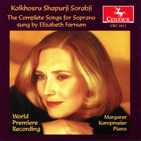Complete Songs for soprano and piano
Elizabeth Farnum (soprano), Margaret Kampmeier (piano)
Centaur Records: CRC2613 (2002)
Web page for Centaur Records

Duration: 56:01
Track listing
- Track 1-3: Trois poèmes pour chant et piano (6:49)
- Track 1: Correspondances (2:41)
- Track 2: Crépuscule du soir mystique (2:42)
- Track 3: Pantomime (1:26)
- Track 4: Chrysilla (3:01)
- Track 5: Roses du soir (3:01)
- Track 6: The Poplars (3:05)
- Track 7: L’heure exquise (2:13)
- Track 8: Vocalise pour soprano fioriturata (2:21)
- Track 9: I was not sorrowful (2:30)
- Track 10: L’étang (2:37)
- Track 11: Hymne à Aphrodite (4:59)
- Track 12: Apparition (2:40)
- Track 13-15: Trois Poèmes (7:05)
- Track 13: Le faune (1:31)
- Track 14: Les chats (3:01)
- Track 15: La dernière fête galante (2:33)
- Track 16-18: Trois fêtes galantes de Verlaine (7:43)
- Track 16: L'allée (2:44)
- Track 17: A la promenade (2:57)
- Track 18: Dans la Grotte (2:02)
- Track 19: L’irrémédiable (6:10)
- Track 20: Arabesque (1:37)
Reviews
- “Elizabeth Farnum … handles the difficult ‘Vocalise’ (1916) with impressive ease.” (American Record Guide)
- “… it would be hard to imagine a more persuasive case made for music too often dismissed as a specialist taste … both artists declare their labour of love in every spine-tingling bar … Poems that take a Swinburnian excess to extremes are somehow magically cleansed of self-indulgence by both artists, such is their style and refinement. Elizabeth Farnum is a richly versatile singer who offers heartfelt thanks to all who made this very demanding and elusive project possible. Both artists sing and play as one and they have been beautifully balanced and recorded. ” (Gramophone)
- “This CD has artistry aplenty … These two (artists) make it seem they’ve been doing this music for decades” (Paul Rapoport)
- “Here is an opportunity to encounter
another facet of this extraordinary composer. Unlike the piano works which
make up the bulk of his output, Sorabji’s songs are relatively straightforward and, while not undemanding, do not imply the superhuman levels of performance with which his music has become associated, and all are of ‘normal’ length for
concert songs of their type. For one thing, they are mostly early — with the exception of the 1941 Trois poèmes and l'Irremédiable of 1927, all are from 1920 or before, and betray the composer’s influences at that time (Debussy, Ravel and Szymanowski, predominantly) to a greater extent than all but the earliest piano works. Although songs form a small part of his output, the voice was of tremendous importance in Sorabji’s musical thinking — some of his
finest musical commentary in his books and reviews was on the subject of
singers and singing, so it is certainly valuable to be able to hear these
works from time to time. Texts and translations included.” (Records International)
- “Elizabeth Farnum’s attractive, agile soprano voice excellently suits this repertoire … she masters the composer’s colossal challenges with relaxed authority … an important release.” (www.classicstoday.com)
- “(Elizabeth Farnum) … is equal to the considerable challenge of these songs which demand and receive both delicacy and a tempestuous fulminant … the singing has about it a dazzling confidence verging on hubris.” (www.musicweb.uk.net/classrev/2003/Apr03/sorabji_songs.htm)
- “pioneering and excellently prepared disc by all concerned … Whereas Debussy looks at his texts as an outsider viewing from the wings, Sorabji is interested in the texts as a vehicle for decoration and elaboration often disguising the personal emotion, although it most certainly does exist and can be found … (Elizabeth Farnum’s) diction is outstanding … (she) is terrific, she has made a specialty of contemporary music but this disc must have taken some preparation as can be seen from the recording dates. Margaret Kampmeier is, if anything, even more outstanding mastering some of the most difficult accompaniments in the history of song writing and never overbalancing the texture. The booklet notes although small are excellent with an essay and also commentary on each song or each set.” (www.musicweb.uk.net/classrev/2003/May03/sorabji_songs.htm)
 Duration: 56:01
Duration: 56:01
